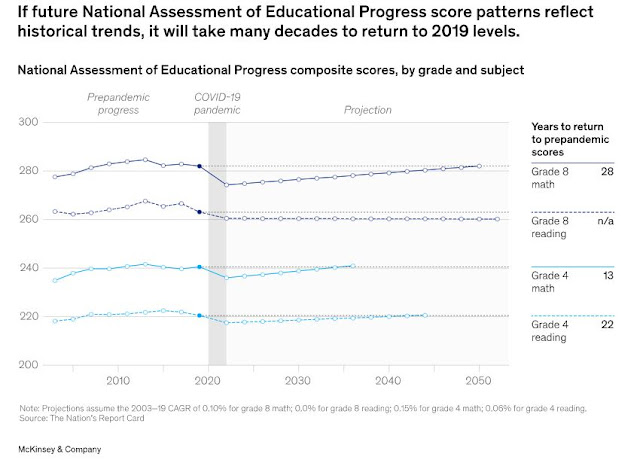Tuesday, January 31, 2023
McKinsey's Ridiculous Projection Of Learning Loss Damage
Koch's Yes Every Kid: Still Selling Privatization
It's that simple. Instead of saying no. We say yes. We're done with negativity. Education reform has been saying "no" for decades. Saying no to educators, parents, and real solutions. Instead, we say "yes." Yes, every kid can learn. Yes, your ideas matter. Yes, together we can make change. We know that if we wait for change to come down from above, it won't be change in the right direction.
Yes, don't wait for things to come down from above, says this website that has come down from a billionaire who wants to drive the education bus despite his complete lack of educational expertise. But this astroturfery is insistent. "Real change has to start from the ground up. We're here as your resource to facilitate conversation." That might be really moving if the very next sentence weren't "We're here to foster a culture of disruptive innovation," which suggests that these facilitaty listeners already have some answers in mind. Also missing-- an acknowledgement of where all that negativity came from. Here is yet another reformy outfit talking about negatives from the past as if they simply fell from space, instead of saying, "Yeah, that was us. Sorry." And here comes the tell:
We want to hear new ideas, new solutions, and new voices. And it can only happen when we listen to the real stakeholders in education: you.
But who is this "we" and why should stakeholders feel any need or obligation to talk to "we" in the first place? This is the same old rich fauxlanthropist baloney-- we're not only going to vote ourselves a seat at the table, but we're also going to go ahead and give ourselves the seat at the head because, yeah, this is our table now. It's so big and generous of you to agree to listen to us, Sir, but I still haven't heard a reason that we should be talking to you.
So how are they doing these days?
Their ideal is a world with as minimal public infrastructure and investment as possible. They want the weakest and leanest government possible in order to protect the interests of a few wealthy individuals and families who want to protect their extraction of wealth from the rest of us. They see private wealth accumulation as a virtue signal because a person can only become wealthy by creating something of exceptional value for the public. In their world view, the more money someone has, the more moral life they've lived, and any attempt to take that money through taxation or other means is a moral issue.
Monday, January 30, 2023
Some Parental Rights Folks Are Going To Have Big Regrets
Robert Pondiscio is fond of pointing out that teachers are not free agents, able to push whatever they wish in the classroom. It is one of the points on which he and I agree; as a teacher, you are hired by the taxpayers, via the school board, to do a job.
It is, like every single thing in education, a tricky balancing act. You are hired specifically to employ your professional expertise and judgment, and because teaching is such a human activity, it takes some regular reflection and self-attention to make sure that your personal stuff doesn't slop over into your professional stuff.
But no--as a teacher, you are not hired by the community to conduct your own personal crusade. Which is not to say that your classroom practice will not be enhanced by an infusion of your personal passions and interests, while at the same time, students are not there to learn about you and supporting the causes that you support, which is not to say--well, look. It's complicated. For me, the defining line was somewhere right around "Are students' grades or treatment in the classroom being affected by how well they agree with what I believe?"
I get the impulse to try to get your students to see Important True Things about life and this country. I believe that if you stick to what is true and you give your students space, they will rise and advance in the direction of true things. But in their time, not yours. And when you try to push and make it happen right now--I understand the impulse, but I can't defend it.
For most of my career, I was paid what was good money for this area, collected from the local taxpayers for the purpose of helping students get better at reading, writing, speaking and listening, which I considered in the context of helping them figure out how to be their best selves while learning what it means to be fully human in the world.
Teaching is a complicated job because on top of everything else, you answer to a hundred different constituencies. Local employers, your board, your administration, the parents, the students themselves, the taxpayers, the bureaucrats and politicians in various capitols who set various policies--you answer to all of the groups, and those groups are themselves filled with a wide variety of ideas and objectives (even if some Very Shouty Members of the group try to hide the diversity with loudness).
It is that large and complex web of constituents that makes public education such a complicated operation, but that web is also what gives public education its strength.
To understand that is to understand how many parental rights activists are being played.
For folks who want to disrupt, defund and dismantle public education, that vast web of constituencies means that implementation of the Three Ds has to happen on many fronts, and so the message has all along been focused on pretending that most of those constituencies don't exist.
Parental Rights groups have been great for this, promoting the fiction that public education exists just to serve parents.
Take, for instance, the manufactured outrage over one Iowa school board members' comments. Some parents lifted some dudgeon up high because board member Rachel Wall posted this:
The purpose of a public ed is to not teach kids what the parents want. It is to teach them what society needs them to know. The client is not the parent, but the community.Sunday, January 29, 2023
ICYMI: Groundhog Day Edition (1/29)
Florida teachers told to remove books from classroom libraries or risk felony prosecution
I'm a Florida teacher who's been forced to cover up the books in my classroom. Here's why I'm suing Ron DeSantis.
Saturday, January 28, 2023
The Magical Thinking of School Choice
While busy implementing super-vouchers to further disrupt, defund and dismantle public education, Governor Kim Reynolds took a moment to tweet this:
Education is not a zero sum game!
— Gov. Kim Reynolds (@IAGovernor) January 27, 2023
We can invest in students, provide parents choice, AND have strong public schools. pic.twitter.com/5LVXtolaUE
Well, of course it's a zero sum game. Unless your state has an infinite supply of money, there's a limit to the number of taxpayer dollars you're going to spend on education, and any piece of that pile that you give to one sector of the education environment will absolutely be taken away from other slice.
But this piece of magical thinking has always been part of the modern school choice movement. "You don't have to settle for your one public school system," the sales pitch has gone. "You can have all these other different school systems as well-- and it won't cost you a penny more!!"
Sure. And when a business is running into financial trouble, a common tactic to make those dollars stretch is to acquire and open a bunch more sites. When a family is having trouble taking care of one house, a common tactic is to buy a second house and move part of the family into that house.
The notion that two, three, four, or more school systems can be operated at the same cost as one public system is a fairy tale, a delusion, a trip to the unicorn farm on the back of a dragon carried by break-dancing fairies. It's believing that daylight savings time makes the sun shine longer.
Occasionally choicers try to pair that fairy tale with the fairy tale of The Public Schools That Waste Money Inefficiently, but you'd have to search far and wide to find a five hundred dollar hammer on school grounds; instead, you'll find teachers in a crumbling room wielding a third-hand stapler that they bought at a Salvation Army and reassembled with some duct tape at home. And at this stage of the game, The Tale Of The Magic Charter School That Did More With Less has been pretty much dropped in favor of The Tale Of The Charter School That Demanded A Larger Slice Of The Pie.
So the choice world hides the extra costs by getting wealthy benefactors to kick in, or hitting up parents for some extra money and/or unpaid labor. Some of the extra cost is simply passed on to taxpayers. That mechanism is admittedly complicated, as laid out by researcher Mark Weber here. Choice can actually raise per pupil spending in public schools, because fixed and stranded costs are spread over fewer remaining students, or because taxpayers put more money into the district to deal with those costs. And it's hard to figure in the "cost" of lost programming.
It is the least surprising thing in the world to conclude that running multiple school systems costs more than running a single system. But somehow choice supporters can never quite bring themselves to make the honest pitch-- "We believe that every child should have a variety of options for education, and we believe in it so much that we are asking taxpayers to contribute more money so that the choice dream can become a reality."
Why don't they pitch that hard reality? Because some great things could be accomplished in that reality. Well, free is always the most attractive cost for a program, and it's particularly attractive when many of the people who are driving the bus actually have the policy goal of shrinking public education spending to zero. And there are always those who sincerely believe in the magical idea that budget dollars are infinitely stretchy. Who knows. Maybe if we close our eyes and wish real hard...
Friday, January 27, 2023
PA: 445 School Districts Call For Charter Reform
Charter funding in Pennsylvania is a miserable mess. Well, it's a miserable mess if you're not running a charter school; if you are running a charter school, Pennsylvania is like Christmas All The Time.
There are several major issues with the twenty-five-year-old funding rules.
One is that charters, for some arcane reason, are reimbursed for students with special needs at the same high rate. Students with inexpensive special needs are a cash cow in this state, simply illustrated by this piece of research from the PA School Boards Association:
In 2014-2015, school districts paid out $294.8 million in special ed supplement money to charter schools.In 2014-2015, charter schools spent $193.1 million on special ed services.
UT: Vouchers Pass With Serious Shenanigans
The creation of the program or establishment of a scholarship account on behalf of
a student does not:
(i) imply that a public school did not provide a free and appropriate public education
for a student; or
(ii) constitute a waiver or admission by the state.







